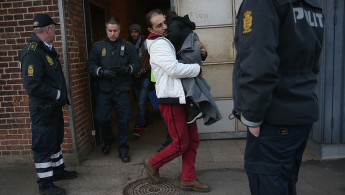Denmark to exclude Ukrainians from controversial 'jewellery law' previously used to seize assets from Syrian, Iranian refugees
Ukrainian refugees, unlike Syrians or Iranians, are likely to be excluded from a controversial Danish "jewellery law" designed to seize valuables from those fleeing conflict.
The immigration spokesman for the Social Democratic government, Rasmus Stoklund, told Danish newspaper Ekstra Bladet that the law should not be applied to Ukrainians fleeing Russia’s invasion because they are from the "nearby region".
The law, passed in 2016 when the majority of refugees coming to Denmark were Syrians, enabled police to confiscate cash and valuables above 10,000 kroner ($1,116 US dollars) from recently arrived asylum seekers.
"The jewellery law is made for if you leave the nearby region…But that is not the case for Ukrainians," said Stoklund as quoted by The Local.
While reports indicate that the “jewellery law” was rarely used since its establishment, there were reports of Iranians having cash confiscated on arrival and suggestions that Syrians and Africans were targeted by the legislation, according to Anadolu news agency.
Critics have called out the sudden rule change as a double standard between the treatment of refugees from Ukraine compared to those from the Middle East and North Africa.
"Never mind equality before the law," wrote Bjorn Ihler on Twitter, co-founder of The Khalifa Ihler Institute. "Underlines yet again the racism behind the legislation!"
Denmark has been repeatedly condemned by the international community for its harsh treatment of refugees, especially those from Syria.
In 2021, the Danish parliament passed a new law allowing for the deportation of asylum seekers outside Europe while applications were being processed.
During the same year, Denmark declared parts of Syria "safe" for refugees to return, despite continued fighting and a brutal crackdown by Bashar Al-Assad’s regime.
In response to Russia’s invasion of Ukraine, Denmark said it was prepared to introduce special legislation to support Ukrainian nationals, including extending visas.
Danish Prime Minister Mette Frederiksen said her country had "a special responsibility in relation to the Ukrainians, who are on the run from Russian missiles and cluster bombs, which now also hit civilian targets", Anadolu Agency reported.
Russia has also been involved in the war in Syria, backing Syrian President Bashar al-Assad with an air campaign since 2015.





 Follow the Middle East's top stories in English at The New Arab on Google News
Follow the Middle East's top stories in English at The New Arab on Google News
![The UAE is widely suspected of arming the RSF militia [Getty]](/sites/default/files/styles/image_330x185/public/2024-11/GettyImages-472529908.jpg?h=69f2b9d0&itok=Yauw3YTG)
![Netanyahu furiously denounced the ICC [Getty]](/sites/default/files/styles/image_330x185/public/2024-11/GettyImages-2169352575.jpg?h=199d8c1f&itok=-vRiruf5)
![Both Hamas and the Palestinian Authority welcomed the ICC arrest warrants [Getty]](/sites/default/files/styles/image_330x185/public/2024-11/GettyImages-2178351173.jpg?h=199d8c1f&itok=TV858iVg)